RENE MARIE / “Strange Fruit”
It’s Billie Holiday’s song. At least that’s how this jazz standard is widely known. Yet, technically it is not a jazz song and Billie Holiday didn’t write it. “Strange Fruit” is a political ballad written by lifelong socialist Abel Meeropol under the name of Lewis Allan and first published in a 1937 edition of The New York Teacher, a union journal. The song was well known in union circles and eventually was introduced to Billie Holiday by Barney Josefson, the founder of Café Society, one of New York’s first integrated nightclubs.
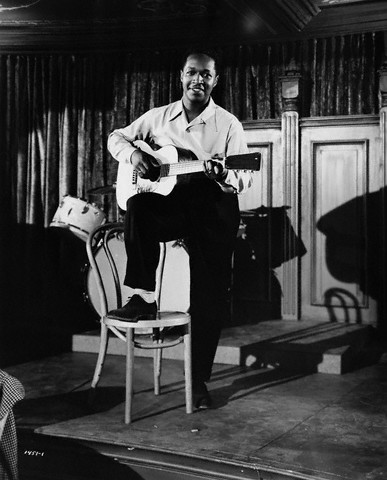 Militant folksinger and blues artist Josh White, who is often overlooked in music history, recorded the song and often sang it in performance. Mr. White, like Paul Robeson, was considered too political for the times and his presence was either downplayed or ignored by the establishment press even though he was a stage sensation in the forties. In the fifties he was a target of the infamous Joseph McCarthy-led HUAC Committee (House Un-American Activities Committee). White appeared before the committee in 1940 giving a detailed history of his childhood in the South and the deprivations he experienced and witnessed. Despite White's cooperation and despite there being no record of White ever being a member of the communist party, Josh White was blacklisted. By the time White was able to record (available on Blood Red River), Billie Holiday had taken up and popularized “Strange Fruit.”
Militant folksinger and blues artist Josh White, who is often overlooked in music history, recorded the song and often sang it in performance. Mr. White, like Paul Robeson, was considered too political for the times and his presence was either downplayed or ignored by the establishment press even though he was a stage sensation in the forties. In the fifties he was a target of the infamous Joseph McCarthy-led HUAC Committee (House Un-American Activities Committee). White appeared before the committee in 1940 giving a detailed history of his childhood in the South and the deprivations he experienced and witnessed. Despite White's cooperation and despite there being no record of White ever being a member of the communist party, Josh White was blacklisted. By the time White was able to record (available on Blood Red River), Billie Holiday had taken up and popularized “Strange Fruit.”
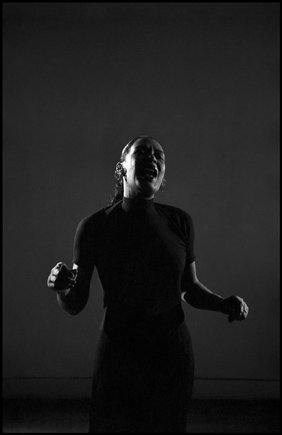 Billie Holiday frequently sang the song in her performances but Columbia Records refused to record “Strange Fruit.” It was eventually issued on the Commodore label in 1939 and on a second session in 1944. Afterwards Billie recorded a number of versions including the 1956 version we include here. No national recording artist of Billie Holiday’s popularity had ever taken such a controversial step before. The recording was considered by some a national affront and was a direct challenge to establishment politicians of the forties and fifties, a time when lynching was still common throughout America. For Billie Holiday, the song was not simply a political statement reflecting her beliefs, it was also an emotional catharsis that often left her drained. One of Ms. Holiday’s main accompanists, pianist Bobby Tucker claimed that Billie would often breakdown after performing the song (available on Lady Sings The Blues).
Billie Holiday frequently sang the song in her performances but Columbia Records refused to record “Strange Fruit.” It was eventually issued on the Commodore label in 1939 and on a second session in 1944. Afterwards Billie recorded a number of versions including the 1956 version we include here. No national recording artist of Billie Holiday’s popularity had ever taken such a controversial step before. The recording was considered by some a national affront and was a direct challenge to establishment politicians of the forties and fifties, a time when lynching was still common throughout America. For Billie Holiday, the song was not simply a political statement reflecting her beliefs, it was also an emotional catharsis that often left her drained. One of Ms. Holiday’s main accompanists, pianist Bobby Tucker claimed that Billie would often breakdown after performing the song (available on Lady Sings The Blues).
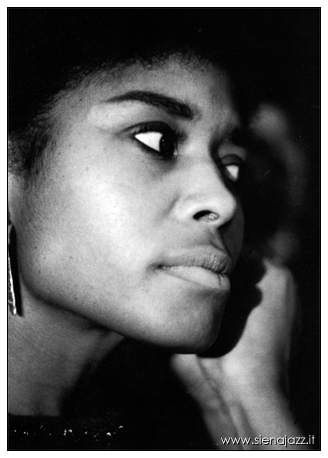 Inspired by Billie Holiday, singer Abbey Lincoln took a stand in opposition to oppression. Featuring tenor saxophonist Harold Vick and recorded live in 1987, Ms. Lincoln’s version of “Strange Fruit” is a personal favorite. Unfortunately the recording is out of print. Rather than a mournful dirge, Abbey Lincoln ups the tempo and sings the song as though it were a jazzy martial anthem to accompany a protest march.
Inspired by Billie Holiday, singer Abbey Lincoln took a stand in opposition to oppression. Featuring tenor saxophonist Harold Vick and recorded live in 1987, Ms. Lincoln’s version of “Strange Fruit” is a personal favorite. Unfortunately the recording is out of print. Rather than a mournful dirge, Abbey Lincoln ups the tempo and sings the song as though it were a jazzy martial anthem to accompany a protest march.
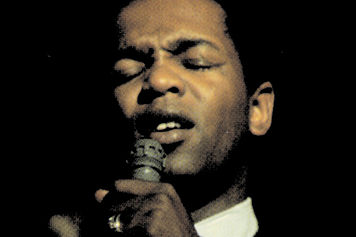 Chicago-based singer Lou Rawls started in gospel music then moved on to jazz before eventually becoming a popular music artist. Rawls offers a big band arrangement (availalbe on Black and Blue/Tobacco Road) that has elements of a Broadway show in its bombastic arrangement. Despite the loud background, Rawls delivers a sensitive and serious reading of the songs poignant lyrics.
Chicago-based singer Lou Rawls started in gospel music then moved on to jazz before eventually becoming a popular music artist. Rawls offers a big band arrangement (availalbe on Black and Blue/Tobacco Road) that has elements of a Broadway show in its bombastic arrangement. Despite the loud background, Rawls delivers a sensitive and serious reading of the songs poignant lyrics.
 Abetted by the beautiful work of tenor saxophonist David 'Fathead' Newman, on the album Over The Rainbow crooner Little Jimmy Scott offers a typically tortured interpretation. Scott’s high, keening voice accentuates the tragic metaphor of “Strange Fruit.”
Abetted by the beautiful work of tenor saxophonist David 'Fathead' Newman, on the album Over The Rainbow crooner Little Jimmy Scott offers a typically tortured interpretation. Scott’s high, keening voice accentuates the tragic metaphor of “Strange Fruit.”
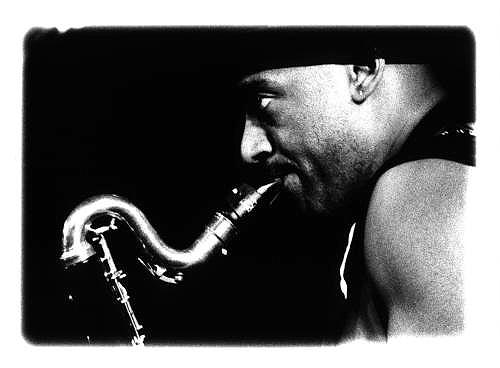 Marcus Miller produced a hybrid album called Tales which features musicians talking about their experiences in the music life in between songs featuring an assortment of singers and instrumentalists. Miller uses Bill Withers reminiscing about a run in with the Ku Klux Klan to introduce a short bass clarinet solo by Marcus Miller. When I first heard this version, I immediately thought of Eric Dolphy, the dean of jazz bass clarinetists, doing his solo version of “God Bless The Child,” another iconic Billie Holiday song. While Miller is not as accomplished a technician as Dolphy was, Marcus Miller does give a stirring reading of “Strange Fruit.”
Marcus Miller produced a hybrid album called Tales which features musicians talking about their experiences in the music life in between songs featuring an assortment of singers and instrumentalists. Miller uses Bill Withers reminiscing about a run in with the Ku Klux Klan to introduce a short bass clarinet solo by Marcus Miller. When I first heard this version, I immediately thought of Eric Dolphy, the dean of jazz bass clarinetists, doing his solo version of “God Bless The Child,” another iconic Billie Holiday song. While Miller is not as accomplished a technician as Dolphy was, Marcus Miller does give a stirring reading of “Strange Fruit.”
 This anti-lynching, anti-racism song is most often associated with Black artists but it was written by a Jewish activist and over the years has been performed by a wide range of artists including numerous international artists. Popular English singer/songwriter/bassist Sting (Gordon Matthew Thomas Sumner) offers his version in tandem with the Gil Evans Orchestra in a live recording from Italy that was made shortly before Evans died (not commercially available). In one sense, this version is an update of the Lou Rawls big band version, except Sting uses rock and jazz where Rawls used R&B and jazz.
This anti-lynching, anti-racism song is most often associated with Black artists but it was written by a Jewish activist and over the years has been performed by a wide range of artists including numerous international artists. Popular English singer/songwriter/bassist Sting (Gordon Matthew Thomas Sumner) offers his version in tandem with the Gil Evans Orchestra in a live recording from Italy that was made shortly before Evans died (not commercially available). In one sense, this version is an update of the Lou Rawls big band version, except Sting uses rock and jazz where Rawls used R&B and jazz.
 On New Moon Daughter chanteuse Cassandra Wilson teams with mercurical jazz musician and raconteur Olu Dara for a steamy version that is full of tension and a smoldering sensuality that highlights the sexual sub-theme of the song. Although she is known primarily as a popular artist today, Cassandra Wilson has a long and accomplished resume as a musical avant gardist and this version draws on that background.
On New Moon Daughter chanteuse Cassandra Wilson teams with mercurical jazz musician and raconteur Olu Dara for a steamy version that is full of tension and a smoldering sensuality that highlights the sexual sub-theme of the song. Although she is known primarily as a popular artist today, Cassandra Wilson has a long and accomplished resume as a musical avant gardist and this version draws on that background.
 In a similar vein, Dee Dee Bridgewater—who made a name for herself first as a jazz singer and then as a Broadway singer before retiring from the United States and taking up residence in France—on In Montreaux offers a very, very dramatic although sotto-voiced version of “Strange Fruit.” Dee Dee sings the song at the limits of her voice, which seems on the verge of breaking down. Some notes are mere wisps rather than full tones. With only piano backing there is nowhere to hide. The intimacy is almost embarrassing. When she finished, I wondered was she alright.
In a similar vein, Dee Dee Bridgewater—who made a name for herself first as a jazz singer and then as a Broadway singer before retiring from the United States and taking up residence in France—on In Montreaux offers a very, very dramatic although sotto-voiced version of “Strange Fruit.” Dee Dee sings the song at the limits of her voice, which seems on the verge of breaking down. Some notes are mere wisps rather than full tones. With only piano backing there is nowhere to hide. The intimacy is almost embarrassing. When she finished, I wondered was she alright.
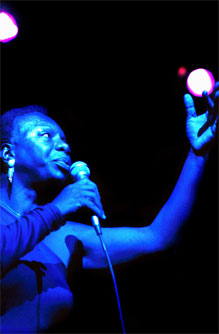 On Pastel Blues Nina Simone is downright brutal in her confrontation. Where Dee Dee was ghostly and Cassandra was evocative, Nina Simone is gut wrenching. Defiant. “Look” her version commands us. “Look at what they did to us.” Simone is the proud and unrepressed voice of a true witness.
On Pastel Blues Nina Simone is downright brutal in her confrontation. Where Dee Dee was ghostly and Cassandra was evocative, Nina Simone is gut wrenching. Defiant. “Look” her version commands us. “Look at what they did to us.” Simone is the proud and unrepressed voice of a true witness.
 We close with Rene Marie offering perhaps the most comprehensive cultural challenge. Ms. Marie hits on the brilliant idea to juxtapose “Strange Fruit” against the all-time Southern anthem, “Dixie.” By the time Rene concludes the song we know that the land of cotton will not only never be forgotten but may never be forgiven. We know that white cotton was watered with the red blood of Blacks. We know that “Strange Fruit” was not simply an aberration of a few hotheads but rather was an index of the violent nature of Southern society. If it is appropriate to say that I have a favorite song of horror, Rene Marie’s version is it.
There are many other version of “Strange Fruit,” however the versions presented here cover the spectrum of interpretations. They range from the late thirties when the song was written, up to Vertigo, which contains Rene Marie’s 21st century reading of this horrific and unfortunately still happening racially motivated killings. Although not as frequently as in the forties, the twisted truth is that “Strange Fruit” continues to grow, rot and drop in the American South (i.e. anywhere below the Canadian border).
—Kalamu ya Salaam
Durian and Rene
We close with Rene Marie offering perhaps the most comprehensive cultural challenge. Ms. Marie hits on the brilliant idea to juxtapose “Strange Fruit” against the all-time Southern anthem, “Dixie.” By the time Rene concludes the song we know that the land of cotton will not only never be forgotten but may never be forgiven. We know that white cotton was watered with the red blood of Blacks. We know that “Strange Fruit” was not simply an aberration of a few hotheads but rather was an index of the violent nature of Southern society. If it is appropriate to say that I have a favorite song of horror, Rene Marie’s version is it.
There are many other version of “Strange Fruit,” however the versions presented here cover the spectrum of interpretations. They range from the late thirties when the song was written, up to Vertigo, which contains Rene Marie’s 21st century reading of this horrific and unfortunately still happening racially motivated killings. Although not as frequently as in the forties, the twisted truth is that “Strange Fruit” continues to grow, rot and drop in the American South (i.e. anywhere below the Canadian border).
—Kalamu ya Salaam
Durian and Rene
To fully understand and enjoy modern music, you have to learn to recognize the sonic fingerprint of entire songs. And not just songs as in four or five minute collections of rhythm, harmony and melody. If you’d like to consider yourself a knowledgeable fan of modern music, you’ll have to learn to recognize bits, snippets, fragments and pieces of songs.I wrote that six months ago. Today, I got an example of what I meant. I was listening to Nina Simone's version of "Strange Fruit," a version I've never heard. Near the end of the song, Nina got to the word 'leaves,' and drew it out, long and hard. She was almost shrieking. Right away, I thought, "I've heard that sound before." I didn't mean I'd heard a similar sound, or the word 'leaves' sung in that way. I meant, I'd heard that sound before. That exact sound. I started flipping through the mental Roledex, trying to place the song that sampled that little bit of Nina. It wasn't coming to me. "Moody," I thought. "Mostly instrumental. No context for the sound." (Before today, I didn't even realize the voice was saying a specific word.) "Somewhat jazzy, but not actually jazz." I still couldn't get it. So I switched it up. Instead of trying to figure out the song, I tried to figure out the artist. "Who's moody, mostly instrumental and jazzy, while not actually being jazz?" As soon as I thought that, the lightbulb turned on: Cinematic Orchestra. They're a band that makes jazz-ish records using samples of real jazz records. And they're almost always moody. I went to iTunes and started clicking through their songs. I picked a couple wrong ones first, but then, I hit on "Durian." The moment I heard the drums, I knew that was it! I started listening to the song (which I'd liked previously just as a sort of moody groove-thing), but now, I was hearing it with different ears. I was hearing it as an interpretation of "Strange Fruit," which, I thought, it may or may not actually be. But then I got curious. Why did they sample Nina in that song and what was with the title? Cinematic Orchestra has a lot of songs with strange titles, so I hadn't previously paid this particular title any mind. Now though, I wanted to see if it had any significance. I typed "durian" in the Google search box and hit 'enter.'
 I found out that a 'durian' is a bizarre-looking Asian fruit that I'd actually seen (without knowing what it was) in a Korean movie I'd seen recently. The closest thing I can think of that it resembles is one of those spiny children's toys that seem on the verge of exploding whenever you squeeze it. That's on the outside. On the inside, it looks like an autopsy. Among American fruits and vegetables, the closest relative to the durian is the okra, itself not exactly the most pallatable-looking edible. "Strange," I thought.
And that's when it hit me. These guys were being quite the comics. A 'durian' is, literally, a strange fruit. And not only that, it's an extravagantly, famously odiferous fruit. In fact, the durian is said to smell so bad that some animals can detect the odor from as much as a half mile away. And, in Singapore (where it's a prized dietary item) a durian is among the few things, along with firearms and cigarettes, specifically disallowed from subway trains. Why is the smell considered so offensive? Because, not only is the odor a powerful one, but also because it is said to resemble nothing so much as the smell of rotting flesh. Nice.
I found out that a 'durian' is a bizarre-looking Asian fruit that I'd actually seen (without knowing what it was) in a Korean movie I'd seen recently. The closest thing I can think of that it resembles is one of those spiny children's toys that seem on the verge of exploding whenever you squeeze it. That's on the outside. On the inside, it looks like an autopsy. Among American fruits and vegetables, the closest relative to the durian is the okra, itself not exactly the most pallatable-looking edible. "Strange," I thought.
And that's when it hit me. These guys were being quite the comics. A 'durian' is, literally, a strange fruit. And not only that, it's an extravagantly, famously odiferous fruit. In fact, the durian is said to smell so bad that some animals can detect the odor from as much as a half mile away. And, in Singapore (where it's a prized dietary item) a durian is among the few things, along with firearms and cigarettes, specifically disallowed from subway trains. Why is the smell considered so offensive? Because, not only is the odor a powerful one, but also because it is said to resemble nothing so much as the smell of rotting flesh. Nice.
* * *
Enough about fruit. I first heard Rene Marie's version of "Strange Fruit" while I was driving around L.A. During that same broadcast, I heard Rene talking about the song, about how she'd perform it back-to-back with "Dixie," and audiences, particularly in the South, would walk out. I think they felt tricked. Rene sings the Dixie part with such feeling, with so much tenderness and passion, that you believe in the nostalgia. (And you know we, as Americans, love nostalgia. My man Gil Scott says we even pick our Presidents based on the emotion. Anyway....) But then she hits the "Strange Fruit" part of the piece and you're like, "Wait. I thought this was a feel-good moment." But Rene told the interviewer that she never intended to trick anyone. She said she meant both parts with equal sincerity. She is proud of the South, of being a Southern girl. And she is disgusted, and still angry, about what happened to her people there. I feel her on that. Katrina isn't the only reason I don't live in New Orleans anymore. I also don't live there because I don't like feeling angry all the time, and living in the South still provides enough reminders of the past that it's enough to keep a conscious black man pissed off 24 hours a day. Of course, Rene is all kinds of technically gifted too. The song's strength isn't just in the juxtaposition of a Southern pride song with a Southern horror song. It's also in the way Rene came up with a new and pretty much pleasant way to sing the melody. Other than instrumental takes on the tune, hers is the only version I can listen to without getting depressed. And that's a compliment. —Mtume ya SalaamThis entry was posted on Sunday, June 10th, 2007 at 2:05 am and is filed under Cover. You can follow any responses to this entry through the RSS 2.0 feed. You can leave a response, or trackback from your own site.
2 Responses to “RENE MARIE / “Strange Fruit””
June 13th, 2007 at 7:57 am
Before all, thanks for the richness and (exhaustive) extensive knowledge you are providing here. Thanks for being (somewhat trying as I do) conscious people concerned. Thanks also for I stop doing anything for 1 or 2 hours every week to be able to read and listen to all the materials you provide. I am here since the beginning even if I don’t reply much.
Today something hit my ears:
Dee Dee Bridge water…before retiring from the United States and taking up residence in France.
I must say here that my ears (and heart, etc…) are french.
As far as I know she still performs and issues discs here, were she always has good review and audience. Reasons why she left the states probably are also explained in the text here up:
“the twisted truth is that “Strange Fruit” continues to grow, rot and drop in the American South (i.e. anywhere below the Canadian border).”
“and living in the South still provides enough reminders of the past that it’s enough to keep a conscious black man pissed off 24 hours a day.”
Yet I apologise for I think that it is not my job to explain her reasons, or to say bad things about america.
Also I add that (including me) we all still love america, and america today. “with so much tenderness and passion.” (text above, again)
Thank you again for stating your opinions and how it insribe into the big and small things of your life.
And Sharing.
Take Care,
C:)
May 29th, 2014 at 12:20 am
This document was well written and informative. I just love what you written. Please continue to teach us it is needed. This is one of the best articles I read on the computer in a long time.
Thank You!!!
Leave a Reply
| top |